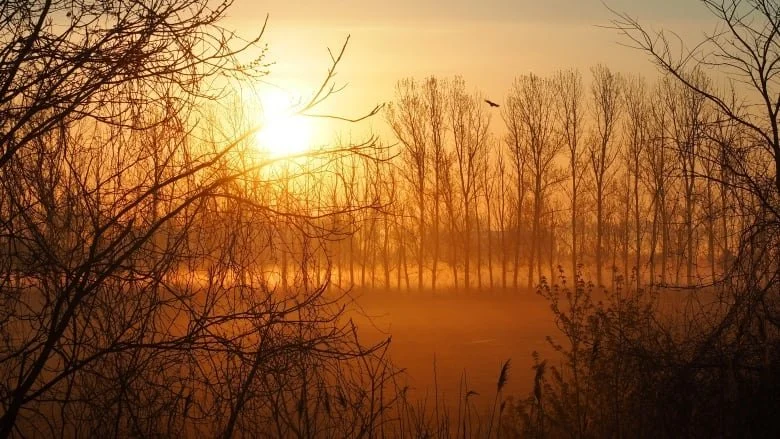Archeologists, historians and divers are trying to digitally capture more than 1,000 shipwrecks at the bottom of the Great Lakes before they become unrecognizable after a combination of invasive mussels and climate change have accelerated their deterioration at an alarming rate. The Great Lakes region is known among diving circles as one of the best places in the world to explore shipwrecks because the cold, fresh water offers ideal conditions for their preservation, even in shallow water.
The Big Idea: Investing in “sponge cities” can mitigate the toll of climate change
My fascination with water began as a child, when I saw rain for the first time. I spent the first 10 years of my life in the United Arab Emirates—one of the driest countries on Earth. My sister and I had eagerly anticipated the first rainfall of our lives, excited to put our new rain jackets to the test. When the first drops spattered on the windows of our house, I felt the excitement and joy bubble up inside me as we ran outside. The cool, calming sprinkle was unlike anything I had ever experienced.
It's been 10 years since the Big Flood. How the changing climate is shaping life in Calgary
In the decade since the Big Flood of 2013, Calgary has seen a number of extreme weather events and scorching, smoky summer days. Four Calgary disasters are included in the Insurance Bureau of Canada's Top 10 list of costliest years for insured losses in Canada — three since the flood, the fourth occurring the year before. The past decade has seen a surprise September snowfall in 2014, a devastating hailstorm in 2020 that resulted in $1.2 billion in damages, and a sweltering and deadly heat dome in the summer of 2021. A number of "catastrophic" weather events have been recorded in almost every year since June 2013, resulting in billions of dollars in damages.
From freak weather to our water supply to optimism and action. Here are answers to your climate questions
Over the last four months, you've sent us over 300 climate questions as part of the Great Lakes Climate Change Project. We've researched the most commonly asked questions and given you answers about extreme weather, our water supply, and how you can both take action and stay optimistic in the face of the climate crisis. Before we jump in, some general takeaways from your questions. Most readers did want to hear about the many ways climate change impacts our lives, but also wanted a focus on solutions. A lot of questions were concerned less with what's new and more on breaking down the long-term processes that have brought us to this point. That's what we'll be focusing on here.
California to meet 100% of water requests thanks to storms
California will provide 100% of the water requested by cities and farms for the first time in years thanks to winter storms that filled reservoirs and runoff from a record snowpack, regulators announced Thursday. The State Water Project will provide full allocations to 29 water agencies supplying about 27 million customers and 750,000 acres of farmland, the Department of Water Resources said. As late as March, the agency was only expecting to provide 75% of requested water supplies.
California lifts some water restrictions after storms and floods
California's stormy winter, which has brought severe flooding and landslides to the state, has led some local officials to lift water rules. Water conservation restrictions have been relaxed for nearly seven million people in Southern California after the state's 11th atmospheric river this season helped ease drought. But experts cautioned drought remains a long-term concern for the state. "Dry conditions could return as soon as next year," local officials said.
Extreme Yosemite rain eases drought but disrupts wildlife habitats
After a winter of epic storms in California, Yosemite National Park's famous waterfalls are in full flow, its reservoirs are brimming, and the snowpack in the surrounding Sierra Nevada Mountains is well above average. In drought-stricken California, that is cause for celebration, but wildlife experts warn that weather extremes driven by climate change can also change habitats too quickly for wildlife to adapt.
California storms boost water allocation for cities
Weeks of historic rainfall in California won't be enough to end a severe drought but it will provide 27 million people with five times more water than suppliers had been told to expect a month ago, state officials announced Thursday. The Department of Water Resources said public water agencies will now get 30% of what they had asked for, up from the 5% officials had previously announced in December. That’s because for the first three weeks of January nine atmospheric rivers dumped an estimated 32 trillion gallons of rain and snow on California. It was enough water to increase storage in the state’s two largest reservoirs by a combined 66%.
When it comes to heavier storms, rain gardens can help
At the most basic level, rain gardens function like sponges. They are typically made by digging five or so feet into the ground, adding layers of rock and soil mixes designed to absorb and filter water, and topping the layers with flowers, trees, and shrubs. A finished rain garden should dip like a bowl about half a foot below ground level so that when it rains, the garden can temporarily fill up, allowing water to percolate into the ground rather than run into the street.
Fiercer storms and bigger waves hasten Tuk’s erosion crisis
The Northwest Territories hamlet has spent years coming up with a plan to move some homes away from its rapidly eroding coast, but the problem could be complicated by erosion of an island that currently protects Tuktoyaktuk’s harbour. With less sea ice cover, storms have more open water across which to whip up waves that can batter the community and hasten erosion.
One in three Canadians think their home insurance policies cover water damage
With severe weather becoming less and less of a rarity across Canada, home insurance is climbing up the list of things Canadians have to double-check. And yet a new survey has found that one in three Canadian homeowners mistakenly think their standard home insurance policy includes flood protection. It doesn’t. The Insurance Bureau of Canada recently revealed that severe weather insurance claims shot up 400% from 15 years ago. Most recently, hurricane Fiona tore through Atlantic Canada and left $660 million worth of insured damage in its wake, making it the most expensive severe weather event in the region.
Narhwal Week, episode 3: Can Canada survive flooding?
This is the third episode in a weeklong collaboration between The Big Story and The Narwhal, an award-winning non-profit publication that provides in-depth coverage of climate issues across Canada. More than 200 million people could be displaced from their homes worldwide in the next few decades as extreme weather events become more frequent and intense. The biggest climate change risk in Canada? Flooding.
Floods, droughts, storms will cost Canadian economy $139B in next 30 years, report says
Floods, droughts and major storms that wash out highways, damage buildings and affect power grids could cost Canada's economy $139 billion over the next 30 years, a new climate-based analysis predicts. The report, titled Aquanomics, was published Monday by GHD, a global engineering and architecture services firm. In an interview with CBC News, the firm's Canadian water lead Don Holland said that the value of water and the costs associated with it are underacknowledged.
Citing the climate 'crisis,' Harris announces $1B for floods, storms
Vice President Kamala Harris called climate change an “immediate” and “urgent” crisis Monday as she detailed more than $1 billion in federal spending to respond to disasters such as deadly flooding in Kentucky and wildfires ravaging her home state of California. On a visit to Miami, Harris announced a series of grants being made available to states to help communities across the nation prepare for and respond to climate−related disasters.
Sask. towns still recovering from devastating weekend weather
Several areas of southeast Saskatchewan were ravaged by storms that toppled trees and grain towers this weekend, while others were hammered by hail and heat waves. "It started with some rain, then the rain progressively got heavier and it just went pitch black outside," said Brooke Hein, a resident of Wapella, Sask., located about 190 kilometres east of Regina. "The rain was like waves hitting our windows and the only time you could see anything outside was when the lightning flashed and you just saw trees bending," she said.
Halls Harbour flooding illustrates dangers of sea level rise on Bay of Fundy communities
Recent flooding in Halls Harbour has helped illustrate that issues surrounding storms and sea level rise in the community have to be addressed. Like many other Kings County communities, Halls Harbour experienced flooding on Feb. 18 and 19. A heavy rain storm and melting snow combined with the high tide to flood Highway 359, leading to a temporary road closure.
Cars, couches, fridges and fuel tanks among 'mountains' of flood debris requiring disposal
Unprecedented flooding in southwest British Columbia last month has left hard-hit communities dealing with the disposal of debris like drywall, insulation, silt-soaked mattresses, couches and kitchen cupboards damaged by water that gutted homes and businesses. Abbotsford Mayor Henry Braun said a second waste transfer station is expected to open for "mountains" of trash left outside homes after record rainfall killed thousands of livestock and devastated a prime agricultural area of the province.
Restoration work at Hillman Marsh to protect region from erosion, maintain wildlife
Two years after erosion at Hillman Marsh Conservation Area was considered "gravely concerning," the coastal wetland in Ontario is now undergoing restoration work to better protect it. In 2019, the Essex Region Conservation Authority (ERCA) told CBC News that erosion along the coastline — specifically along Wheatley Provincial Park, Hillman Marsh and Point Pelee National Park — was "active and significant."
Risk of drinking-water contamination from manure increased in flooded areas, says province
Provincial health officials are warning owners of private drinking-water wells in flooded sections the Fraser Valley Regional District, and the Metro Vancouver Regional District, that their wells may be at increased risk of contamination. “This is due to potential overflow or failures of liquid-manure storage systems because of high precipitation caused by recent storms,” according to the Dec. 5 news release from Ministry of Health.
Province warns next 10 days could be 'quite challenging' as more storms set to hit B.C.
British Columbia is bracing for more rainfall in the coming days and weeks as the province works to rebuild after unprecedented precipitation earlier this month. Up to 80 millimetres of rain is forecast for Metro Vancouver, Howe Sound, Whistler and the Fraser Valley, starting this morning and continuing until Friday. Strong southeast winds near the water are also predicted as part of this weather system, and freezing levels will rise above mountain tops, which could trigger snowmelt and worsen the flooding situation.





















